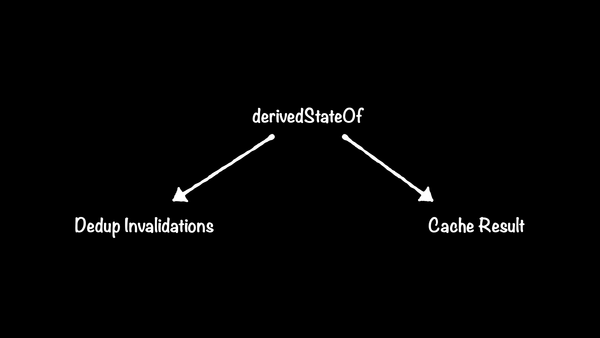remember { mutableStateOf() } – A cheat sheet
If you've ever read any Compose code, you've probably seen this at least a million times:
var text by remember { mutableStateOf("") }
What the heck is that? There's a lot going on. The goal of this post is to pull the pieces apart, show how which parts do what, and how they all fit together.
tl;dr
Really quick cheat sheet (more of a cheat card):
byhas nothing to do with Compose. It declares a delegated property.rememberandmutableStateOfare completely independent concepts. They just happen to be used together a lot. Just like how databases and RxJava are completely independent but fit nicely together for certain use cases.rememberkeeps a value (any value) consistent across recompositions.mutableStateOfreturns aMutableState. ThinkmutableListOf.MutableStateis just a thing that holds a value, where Compose will automatically observe changes to the value. ThinkMutableLiveData, but you don't need to callobserveyourself.
| ⚠️ Gotcha! |
|---|
|
You may need to manually import a couple functions to make the property delegate compile. This is a known IDE bug, hopefully it gets fixed before 1.0. import androidx.compose.runtime.getValue import androidx.compose.runtime.setValue // only if using var |
"State": it's a thing
Probably one of the most overloaded terms in UI programming, certainly in Compose, is "state".
In its most general, "state" refers to any data that is held in memory (either RAM or on disk). State can change over time, but those changes are persistent for some period of time. State can live in variables in a function, or properties/fields in a class.
In other words, something that is "state" has two properties:
- It exists over time. This is what
rememberdoes. - It can change. This is what
mutableStateOfdoes.
Property delegation
var foo: T by bar
This is property delegation. Property delegation is a Kotlin feature. It has nothing to do with Compose. It's been a core feature of the language for… ever, I think.
Remember that a property in Kotlin is effectively just a pair of getter and setter methods. In the above code, the compiler generates fun getFoo(): T and fun setFoo(value: T).
A property delegate is an object that has special getter and setter methods (or extension functions). When you use the object on the right side of the by in code like above, the getFoo and setFoo methods call (delegate to) the delegate's getter and setter, respectively.
Delegated properties can be both class properties and local properties (i.e. vals and vars defined in a function).
mutableStateOf supports a variety of ways to interact with it. Property delegation is one option, but you can also just treat it as a regular object.
remember: Keeps a value over time
remember is a composable function that "memoizes" the value returned from the function (lambda) you pass to it then returns that value, allowing you to create state that persists across recompositions. "Recomposition" means when a composable function is called multiple times to update the UI.
The first time a composable runs that calls remember, it executes the lambda to get the value. It then stores (memoizes) that value in the composition. The next time that composable is recomposed, the call to remember will see that there was a value stored from the last call and just return that. You can remember any type of value – primitives, your own classes, anything. One of the things you can remember is the MutableState type, but there’s nothing special about it.
Note that you only need to use remember inside composable functions (and the compiler will complain if you try to use it anywhere else). Outside of composables there are other ways to store state. For example, if you're writing a class, you'll probably put your state in properties in that class.
mutableStateOf: Observable state holder
State is only really useful if it can change over time. We need a way to change it, and we need a way to react when it changes. In that var text by remember { mutableStateOf("") } line, a whole bunch of pieces are in play:
State<T>
A type that holds a read-only value: T and notifies the composition (and other “snapshot observers”, like layouts) when value changes.
- A “read” is tracked whenever code calls the
valuegetter, even if there are multiple call stack frames (function calls) between the actual property and the thing reading the state. - This means that if you have a
foo: State<T>, and a functionfun getFoo(): T = foo.value, both readingfoodirectly and callinggetFoo()will be considered “reading foo” by a snapshot observer and cause the observer to be notified whenfoo.valuechanges.
MutableState<T>
A subtype of State<T> that allows setting value. When the value is changed, any snapshot observers that read value will be notified when the snapshot is applied (i.e. when preparing the next frame).
- It’s a common pattern to hold a
MutableState<T>as a private class property, then expose it publicly either as aState<T>or as a regular property that has the typeT. Stateis toMutableStateasListis toMutableList.
State<T>.getValue()
An extension function on State<T> that allows instances to act as property delegates for read-only properties (vals), via the by syntax.
MutableState<T>.setValue()
An extension function on MutableState<T> that allows instances to act as property delegates for mutable properties (vars).
mutableStateOf(): MutableState<T>
A function that creates a MutableState<T> given an initial value.
- This function is analogous to
mutableListOf(). - This is not a composable function – you can call it from regular code. In fact it’s quite common to use the function to create properties or property delegates for regular classes.
Putting the pieces together
These snippets all do the same thing.
@Composable fun MyField() {
var text by remember { mutableStateOf("") }
TextField(text, { text = it })
}
Without using the delegate (notice by -> =, var -> val):
@Composable fun MyField() {
val text = remember { mutableStateOf("") }
TextField(text.value, { text.value = it })
}
Pulling state into a separate class, using a property delegate. Notice mutableStateOf is not directly wrapped with a remember here, because it's not being called from a composable function. Instead, the thing being remembered is the class instance itself – remember instantiates the class.
class MyFieldState() {
var text by mutableStateOf("")
}
@Composable fun MyField() {
val state = remember { MyFieldState() }
TextField(state.text, { state.text = it })
}
Giving the class a more fancy API:
class MyFieldState() {
var text by mutableStateOf("")
private set
fun setText(text: String) {
this.text = text
}
}
@Composable fun MyField() {
val state = remember { MyFieldState() }
TextField(state.text, state::setText)
}
Dive deeper
We've just scratched the surface. Here's a teaser:
remembercan be given keys to trigger re-calculation of its value.MutableStatesupports destructing.MutableStatecan be told how to conflate values, and even how to merge changes made from different threads.- You can create
Flows that observeStatevalues. remembered values can be notified when they enter and leave a composition.
The official docs go into a lot more detail.
- Delegated properties in the Kotlin language spec
rememberreferenceMutableStatereference- State and Jetpack Compose article
- Using State in Jetpack Compose codelab
- Jetpack Compose: State video
Also, check out my other articles about Compose state.
Thanks to Colton Idle for requesting and giving feedback on this post.




